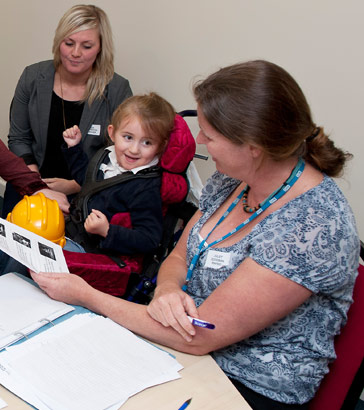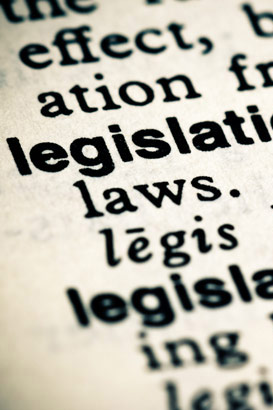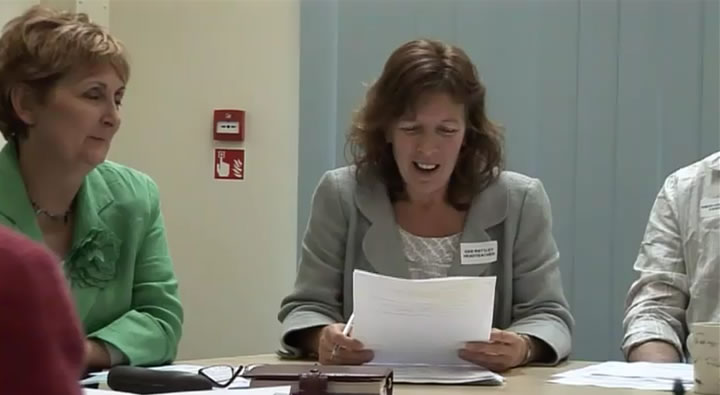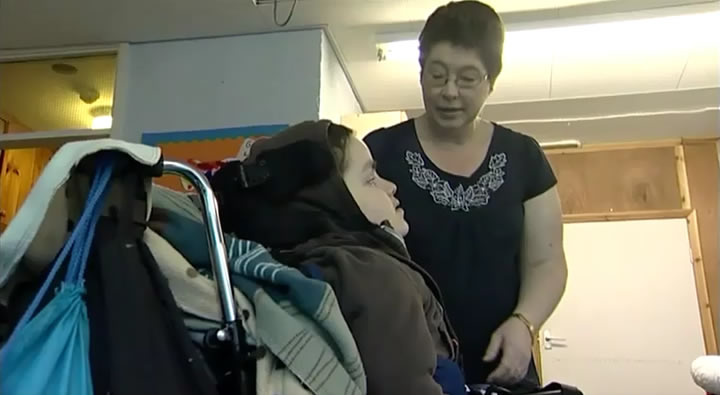
There are a range of services provided for children with disabilities including:
- Mobility aids.
- Adaptations to the family home.
- Speech and language therapy.
- Physiotherapy.
- Play groups.
- Home education programmes.
- Respite care.
Sometimes, the absence of essential services can hinder a child's independence
and achievement.
Sophia spends some of her time in a mainstream school and some in a special school.
She needs a 'Tech/Talk' to help her communicate but, at present, she only uses it
in her special school setting.
Watch this clip from Sophia's review, where the availability of Tech/Talk is discussed.
Now listen to Simon, Harvey's dad, talk about the lack of support for Harvey's speech and language needs.

arrangements are
made in your school
for the provision and
allocation of:
- Physical resources (equipment);
- Human resources
(staff and
volunteer time).
Local authorities must provide 'all or any' of the welfare services listed
in the Chronically Sick and Disabled Persons Act (CSDPA) 1970, where they
assess that the relevant need exists. However, they may set eligibility
criteria, which can vary greatly between regions, resulting in children
with the same needs receiving different levels of support depending on where
their family lives.
The Chronically Sick and Disabled Persons Act (CSDPA) 1970 (Section 2) lists
the following welfare services:
Practical assistance at home
Meals
Holidays
Educational facilities
Recreational facilities
Media
Telephone equipment
Travel assistance
Home adaptations
Return
Return
Return
Return
Return
Return
Return
Return
Return

It is legitimate for local authorities to use eligibility criteria in order
to prioritise those most in need of services, though these procedures must
be transparent and comply with the public sector equality duty under section
149 of the Equality Act 2010.
Eligibility criteria can vary greatly between authorities, so children with
the same needs may receive different levels of support depending on where
their family lives.
The need for guidance on the consistent use of eligibility
criteria for children was identified by a judicial review,
R(JL) v Islington London Borough Council (2009), known as the 'Islington Judgement'.
However, no such formal
guidance has yet been forthcoming.
Children with complex needs often have frequent and/or extended stays
in hospital.
Travel associated with attending hospital appointments should be supported
by health services. Where a child's disability makes transport difficult,
the hospital should provide an ambulance or hospital taxi.
Where a child's disability allows the use of ordinary transport, families
on low income may receive support from health services, depending on their
particular circumstances.
Where travel costs are associated with the family visiting a child in hospital,
then these may be met by Children's Services under the Children Act 1989.
The National Service Framework (NSF)
states that 'hospital stays should
be kept to a minimum', but also that the needs of carers should be considered
when a discharge from hospital is planned. If a child needs to attend hospital
appointments in relation to their disability, then travel to and from hospital
should be supported by health services.

A hospital social worker should, if requested to by the family, carry
out a Carer's Assessment under the Carers (Recognition and Services) Act
1995, so that the family's capacity to manage the child at home is fully
assessed. The provision of short breaks for carers is now a statutory duty
under paragraph 6 of schedule 2 of the Children Act 1989 (as amended by
section 25 of the Children and Young Persons Act 2008).
Carers can also apply for direct payments under the Carers and Disabled
Children Act 2000, and seek support to pursue their own education, training,
employment and leisure aspirations under the Carers (Equal Opportunities)
Act 2004.
Following discharge from hospital, the family's GP is required by the National
Health Service Act 2006 to provide necessary and appropriate services, including
referrals to specialist services and also to the local authority for social
care support.
Listen to this clip in which Caroline, the mother of a child with complex
needs, talks about how important respite care and the care provided by a
children's hospice is for her family's quality
of life.

The interpretation of the impact of these treaties upon legal judgements
and the responsibilities of individuals and agencies is another key area
of case law.
European and International Courts also provide a higher level of appeal
for individuals who wish to challenge decisions made by UK courts of appeal.
UK law broadly reflects the contents and intentions of these international
rulings, though the UK government has determined that UK law may not fully
enact some specific issues.
It is as well to remember that not all parts of the United Kingdom have
the same legislative framework.



